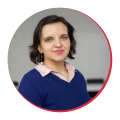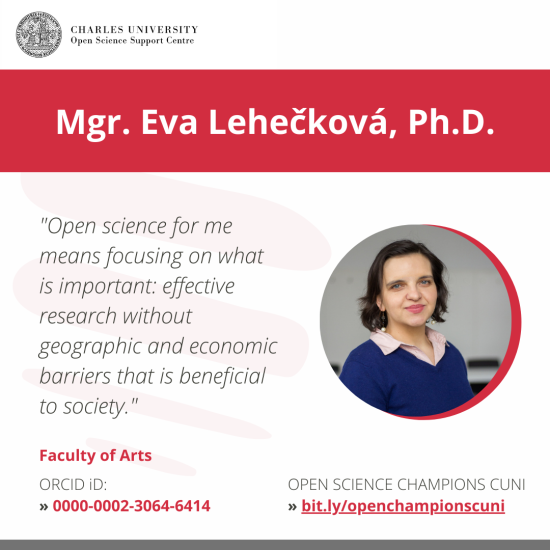 Institute of Czech Language and Theory of Communication
Institute of Czech Language and Theory of Communication
Faculty of Arts
ORCID: 0000-0002-3064-6414
Scopus Author ID: 57195135036
Twitter: @LeheckovaEva
The first impulse for following the principles of open science for me was in 2009 when I became the deputy editor-in-chief of the new journal Studie z aplikované lingvistiky, whose publisher, the Faculty of Arts of Charles University, strategically decided to publish all journals in open access. Although I have previously been a user of freely available data from large research infrastructures, such as the Czech National Corpus, since then, I have become more interested in how far the principles of open science can reach, and I have become a dedicated follower of them. In our research group, we try to expand the areas in which we implement the principles of open science, even though we have achieved this gradually and indeed by looking at good practices from abroad.
Currently, there are three areas: 1. Repeated consideration of whether publishing options are available in the open access mode and then preferring them when publishing research results (in addition to my own work also in cases where I am the editor of a collective work, such as the thematic issue of a journal ). 2. Work with freely available data, support for students to consider the possibilities of their future use and sharing when collecting data for theses, participation in the creation of shared data – I am currently participating in the development of a multimodal Czech corpus CZICO. 3. Most recently, it is the pre-registration of some research through the OSF platform, which is gradually becoming a standard even in the field of linguistics I am involved in.
For me, it especially means fairer access to academic information, which enables the continuous development of research and better dissemination of research results. Another benefit is transparency, for example, when data are available and how they are processed, what the interpretation of research results in scientific studies is based on – this facilitates both the replication of research and quality control. At this point, the principles of open science meet up with the ethical principles in science, which ensure that data sharing is possible only where the rights of respondents in such research, which often involve vulnerable groups, are not violated.
In my opinion, it is a functional step to look at how good practice works in their field abroad, and gradually introduce elements of good practice into their own research. For those who collect data for their research, I would recommend consulting with experts in digital humanities and processing the data in such a way (e.g. using XML or the TEI standard) to facilitate their future use and sharing with other researchers. I am convinced that we can be much smarter and more open in this respect in the various areas of linguistics.
First of all, in some parts of the system, it is a matter of overcoming the mental block that it is safe and correct to share data under certain conditions, and that it will be beneficial for the whole scientific community. Secondly, sufficiently user-friendly and mutually compatible tools must be developed for managing and sharing data and research results, so that even less technically experienced researchers have the feeling that it is easy to follow the principles of open science.
Open science for me means focusing on what is important: effective research without geographic and economic barriers that is beneficial to society.

Residency, Invoicing and Correspondence Address
Charles University
Central Library
Ovocný trh 560/5
116 36 Prague 1
Czech Republic
Office Address
José Martího 2 (2nd floor)
160 00 Prague 6
Phone: +420 224 491 839, 172
E-mail: openscience@cuni.cz
Www: openscience.cuni.cz